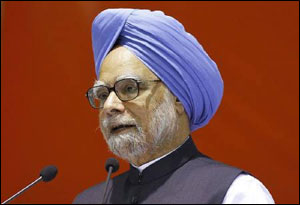Isn’t it funny that we are importing in excess of $50 billion of gold every year while simultaneously pleading with foreigners to invest a few billions? asks M R Venkatesh.
Bollywood movie buffs will bear me out on this. String instruments like sitar and veena are played in the background to symbolise happy times. On the contrary, to highlight melancholy, bow instruments like the violin is extensively used. In the run up to the Budget 2013, the nation seems to be filled with violinists.
Years of lack of attention to governance by the UPA government took its toll on production within our economy. This created systemic supply side shortages resulting in inflation.
 Thanks to indifference of the UPA government to this structural issue, soon inflation spiralled out of control. To rein it in, RBI reset interest rates higher. However RBI was willing to strike but afraid to wound. Unsurprisingly, that had the calculated effect of lowering growth, not inflation.
Thanks to indifference of the UPA government to this structural issue, soon inflation spiralled out of control. To rein it in, RBI reset interest rates higher. However RBI was willing to strike but afraid to wound. Unsurprisingly, that had the calculated effect of lowering growth, not inflation.
But there is yet another dimension to this. Since interest rates on bank deposits were lower than inflation fiscal savings moved to lucrative avenues viz., gold. That brought down the savings rate from above 37 per cent in 2008 to less than 30 per cent in 2012.
Simultaneously, as Indian appetite for risk free and highly rewarding investment in gold grew, India imported higher quantity of gold - approximately $55 billion in 2011-12. For 2012-13, our gold imports are significant through marginally lower than previous year.
As higher gold imports lead to higher import bill, global economic slowdown ensured that our exports did not keep pace with our imports. Consequently, we became extremely vulnerable on the external front and run the risk of a significant Rupee devaluation very shortly.
That makes importing crude that much costlier (80% of our crude is imported) and thereby triggering cost push inflation. In short, thanks to the myopic policies of the UPA government, we have both cost push and demand pull inflation.
But the issue of current account deficits is no longer restricted to gold and crude. Remember, as mentioned above, inflation is caused by shortfall in domestic production too. For instance in 2011-12, we imported Rs 100,911 crore (say $20 billion) of “sensitive” items as compared to Rs 70,656 crore in 2010-11 - a spectacular rise of 43 per cent!
Clearly, these imports add to the current account deficits while simultaneously robbing employment opportunities to Indians. This includes mundane items like milk and milk products, fruits, vegetables, pulses, edible oils, rubber, spices, toys and other sundry items that could easily be produced or manufactured in India.
If such items are imported why complain about gold and crude? There is yet another disturbing piece of information - our trade with China. For the first nine months (April-December 2012) of this fiscal, imports from China exceeded $41.3 billion while exports were a mere $9.7 billion. This implies a huge trade gap in excess of $40 billion for the entire year.
Surely, this lop sided trade is unsustainable. Let us not forget that these imports from China do not include much of hi-tech items. Importantly, such huge imports of such items have a debilitating and cascading impact on semi-skilled and unskilled employment within the country.
This is where UPA’s economic policy has gone horribly wrong.
All round failure
The lower savings rate mentioned above has yet another ominous dimension. Thanks to high inflation and higher returns on gold, Indian household financial savings has significantly dried up. That made our economy significantly dependent on foreign flows for financing current account deficits as well as to fund domestic investments.
But this raises fundamental questions. Isn’t it funny that we are importing in excess of $50 billion of gold every year while simultaneously pleading with foreigners to invest a few billions?
In a country where locals are reluctant to invest in the domestic economy (and that is why they are investing in gold!), it is trite argument that foreigners would rush to invest into India.
Indians or foreigners, either way, capital formation has suffered significantly in the past year or two. No wonder, the index of industrial production for the period April-December 2012 points out that capital goods production is down by 10 percent when compared to the corresponding period of 2011-12. Surely, economic recovery is long way off.
Another evidence of massive trouble confronting the Indian economy is that the approximately 20 per cent of the loans extended by banks are reported to be under severe stress. Obviously, when growth is hampered, less than optimal capacity utilisation brings resultant stress on servicing loans. Much of their poor performance can be traced to governance issues.
As savings nosedives, investment splutters and domestic production is hampered. The net result - industry is slated to grow at less than one per cent while services may clock seven percent at best for the current fiscal. Apart from impacting the economy on the downside, lower growth dynamites the revenue projections of the government.
Yet, the revenue department has gone ballistic in recent months to achieve budgeted “revenue targets” little realising the damage such an approach is causing to the overall investment climate in the country. Bizarre interpretations, unstable tax laws and cantankerous revenue department do not help create conducive investment climate.
Paradoxically, the UPA invites foreign investments on one hand only to terrorise them with weird interpretations of tax laws. While foreigners are learning it the hard way, domestic entrepreneurs have learnt it long back - not to trust our government or its promises.
If revenue shortfall brings one set of problems, unrestrained expenditure is another side of the same coin. A government that is not fiscally discipline is doing a great disservice to future generations. But the lust of office is so great that it is impossible to believe that the UPA government will be anything but reckless when it comes to handling public finances.
Remember, fiscal deficit is not a mere number. It is the aggregate amount borrowed by government. Such huge borrowing (expected to be more than 5.3 per cent of the GDP for the current year) leaves very little for the rest of us to borrow and invest.
Importantly by borrowing such huge money, government puts it to unproductive use and thereby wasting our precious savings. That in turn makes borrowings dearer and our industry uncompetitive even within India. That explains why India imports over Rs 100,000 crore (Rs 1,000 billion) of “sensitive” items.
Either way, surging imports of sensitive items epitomises all that is wrong with our economy. If we continue to import milk, pulses and edible oils not to forget toys and umbrellas, we are in for a massive trouble on our external front. But who cares?
Can a hundred minute speech cure all this?
This in short is the context to the Budget of 2013. Even Jesus Christ on the cross has more elbow room than the finance minister in the run up to this year’s Budget.
Much as things look bleak, let me assure readers that all is not lost. Things are retrievable even now provided we are ready to pay a cost, arrange ourselves and be disciplined. After all, for far too long we have been reckless. Crucially, we must signal to the world that we have begun to put our fiscal house in order.
Honestly, the finance minister has made the right noise in the run up to the Budget. So have the editors of pink papers and sundry economists who have demanded that the FM must bring down fiscal deficit to 4.8 per cent of the GDP in 2014-15 and roll it back by sixty basis points in the following three years. But that is only the beginning.
I am sure the FM will conjure to bring down the fiscal deficit to targeted level by over-estimating revenues [probably by introducing a few new taxes and hiking tax rates] and under-estimating expenditure. And that is for the consumption of rating agencies. Then on, our FM is eminently capable of bamboozling all of them with his persuasive arguments.
Even otherwise there is a larger question that would remain unanswered - restoring investor confidence. Obviously, Budget 2013-14 cannot be a template exercise; mathematics is no answer to psychology. And this is precisely what the FM will in all probability attempt - to shore up negative psychology by seemingly addressing only the fiscal deficit conundrum.
Can a budget speech presented by the FM in chaste English and laced with wry humour and choicest of Kurals be a substitute for sound economics? Can FM in a hundred minute speech turnaround the negative investor psychology and trust deficit caused over a period of time?
Will he adhere to the promise of holding on to deficit targets despite an election year? Will tax laws be stable and predictable? Why should investors not continue to invest in gold which provides better returns? Why should importing into India be a wiser proposition than manufacturing in India? Will inflation be controlled? Will rupee be stable?
Will the FM answer these questions in his Budget? Can he silence the nation that is in Rudali (an elegy song sung in parts of India) mode? Or will he, like the PM maintain silence on all these issues?
The author is a Chennai-based Chartered Accountant. He can be contacted at mrv@mrv.net.in








